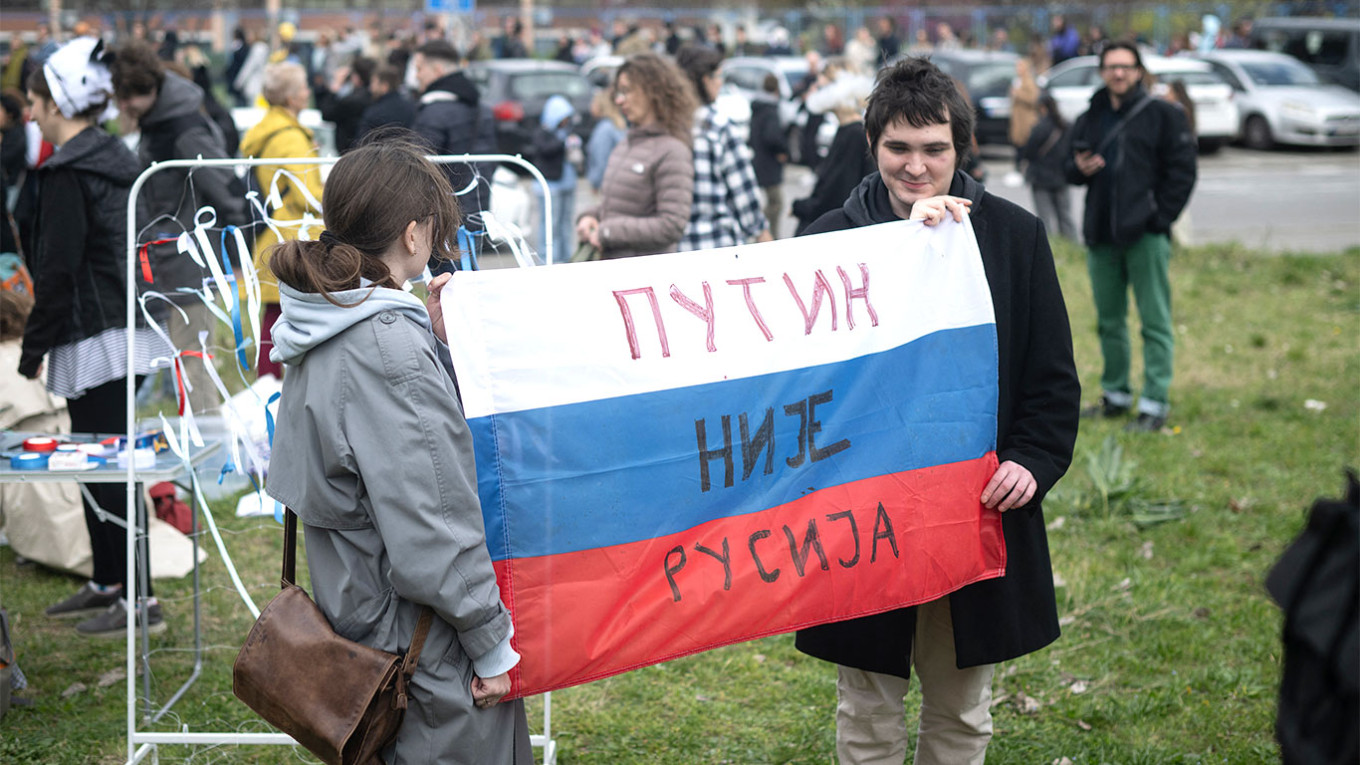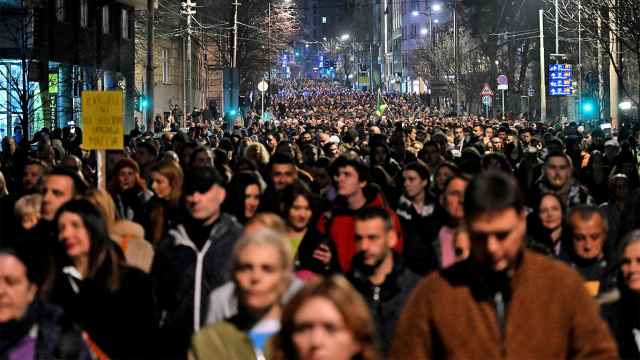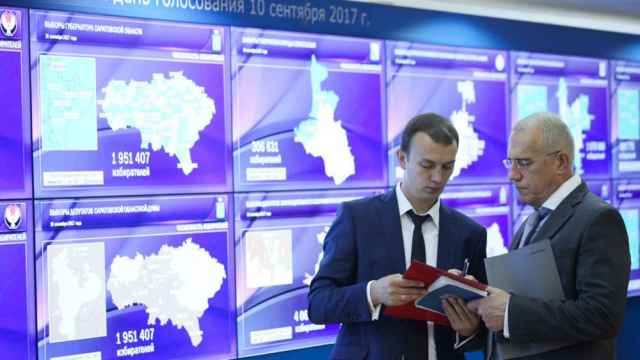BELGRADE, Serbia — Thousands of Russians lined up at the Russian Embassy school on Sunday for Noon Against Putin, a protest aimed at showing the scale of resistance to the Russian president in an election he had no chance of losing.
The line, stretching over a kilometer, formed a ring around the school, prompting one voter in the crowd to liken it to the Ouroboros, the snake eating itself. Observers said the line in Belgrade was one of the largest turnouts worldwide during Sunday's event.
Around half of those The Moscow Times spoke to were registered to vote, and the other half had come simply to show solidarity for the Noon Against Putin movement, which gained momentum in Serbia in the run-up to the election.
Among them were Pyotr, Alexei, Tanya and Nastya, a group of young Russian professionals in their late 20s living in Belgrade.
None of them believed the vote would change anything, but said “It’s better than doing nothing.”
“It’s for the self-confidence of everyone here. To show the world that there are good people from Russia, to show solidarity to ourselves and each other, to break the spiral of silence, and to show the rest of the world and especially the EU that the Russian anti-war opposition parties need global support,” said Pyotr. “We can’t smash Putin alone.”
He added that he was sending videos of himself in the line to family members still in Russia who support the regime to convince them that the opposition movement is strong.
“The vote will, of course, be rigged. But crowds at the polling stations cannot be rigged.”
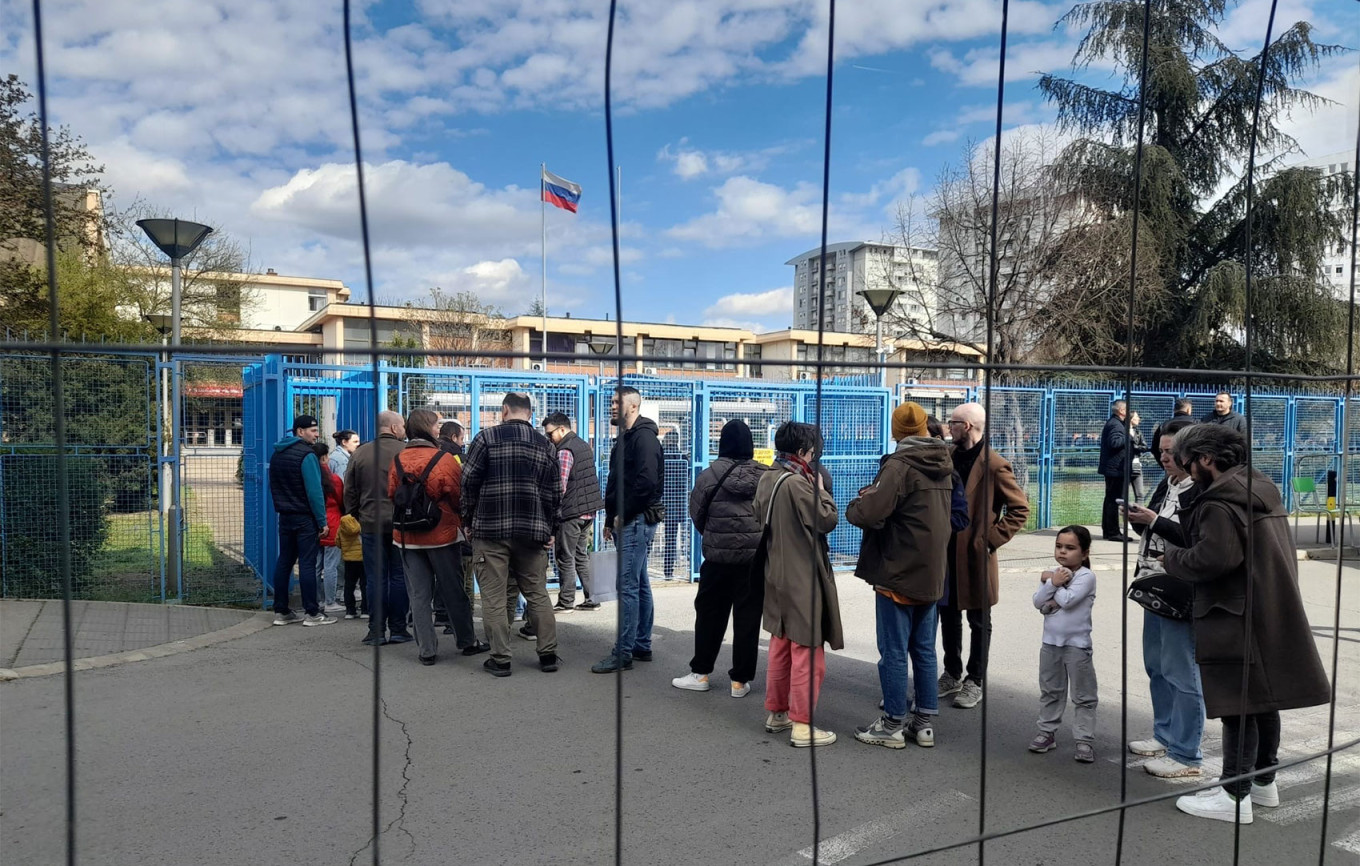
Alexei, a lawyer, said: “I’m not afraid to vote [against Putin] despite the risks because I have nothing left in Russia: no family, no property. But I understand the people who feel they can’t show their names and passports because they are scared for their family.”
Nastya said that Navalny’s last message had encouraged her to come into the streets. “We can’t let him down, she said, adding that she felt inspired seeing everyone as it felt “morally positive.”
Over 370,000 Russians moved to Serbia after the invasion of Ukraine, approximately 6,000 of whom registered to vote, according to the Voteabroad.info NGO and Russian activist society RDO, whose website and Telegram channel have been offering guidance on remote voter registration.
While voter turnout on Friday and Saturday was almost non-existent, Sunday saw thousands of Russians travel from all over Serbia to join the line. Tickets from Novi Sad and Nis to Belgrade were sold out, and travelers said trains to the capital were crowded.
The mood in the crowd was upbeat. However, a fight broke out when an unknown man challenged activist Peter Nikitin, who was chanting anti-Putin messages. Serbian police swiftly broke the two apart and took them aside where they continued to argue.
Nastya voiced relief that voters did not have to enter the Russian embassy.
Many had worried about showing up to the polling stations before the election. Tanya, a mother of three in Belgrade, said she was too afraid to vote or attend the protest.
“When I first came to Serbia, I felt okay with being vocal. But we’ve seen intimidation of activists in Serbia and we understand we’re not so safe here,” she said. “Navalny said we mustn't be afraid, but I still have family in Russia and it’s a risk.”
“For me, it’s better to remain invisible and instead give money to organizations that help Ukrainian refugees, or slowly try to persuade pro-Putin people to change their views. What else can I do?”
Ultimately, Tanya attended the event after friends sent her photos of the crowds in Belgrade. “There are so many of us that it feels safe,” she said.
The group said they expected to wait in line for four hours before they could vote.
Though initially vocal in their opposition, the Serbian diaspora's anti-war activism waned after several apparent instances of cooperation between Serbia and Russia in targeting activists. Four anti-war activists were deported from Serbia in 2023; another was nearly deported in February for signing an anti-war letter.
But recent months have seen a resurgence of activist solidarity in Serbia, buoyed by the campaign to support anti-war politician Boris Nadezhdin’s presidential candidacy and by Alexei Navalny’s death in an Arctic prison.
In both cases, Russians took to the streets in solidarity despite the CCTV cameras trained on them and the suspected presence of security service agents among the crowd.
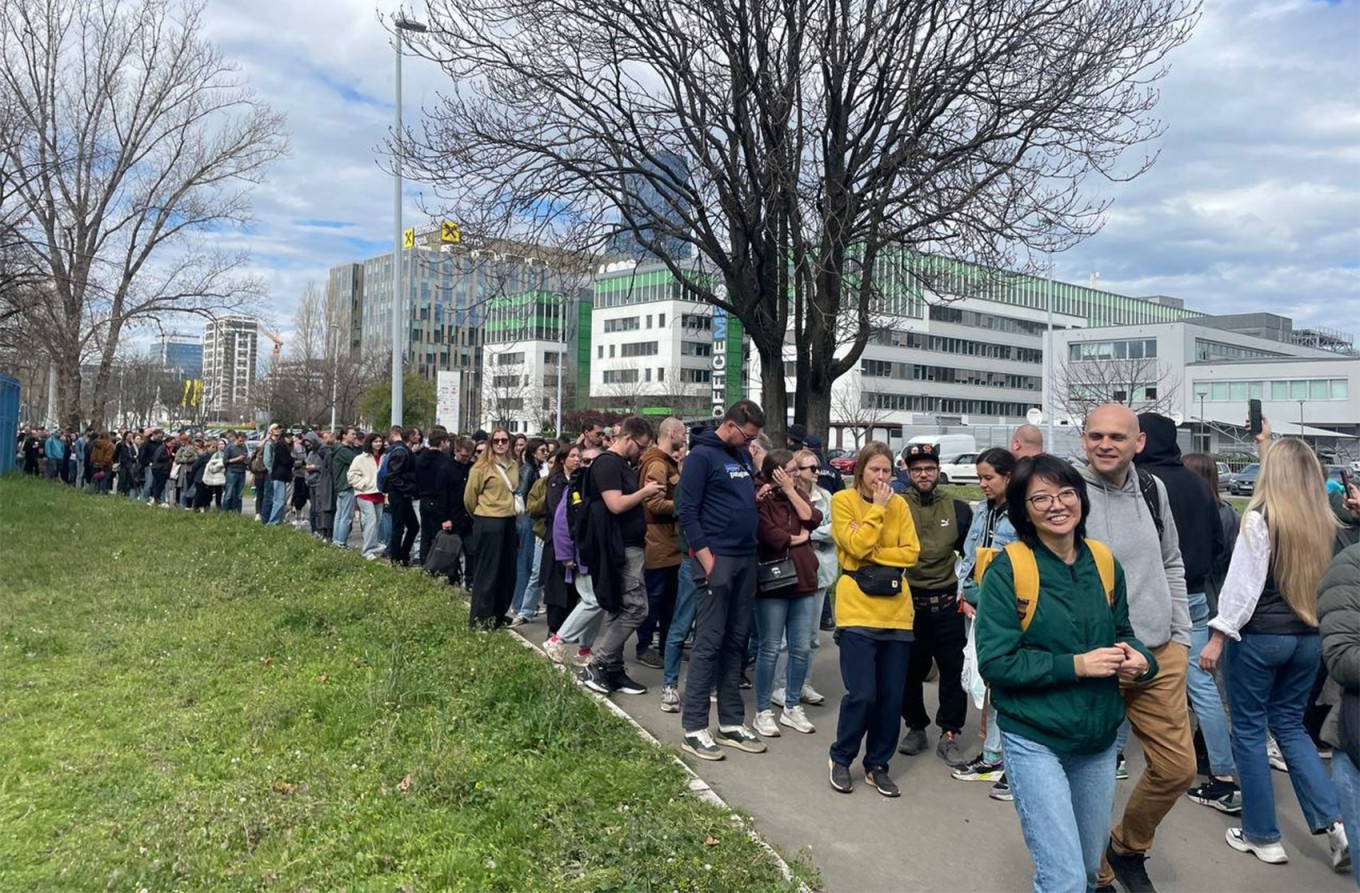
Speaking at the Navalny memorial outside the Russian Embassy in Belgrade, one IT worker from Moscow said he was no longer worried about showing his face anymore.
“The authorities can do nothing to us now, there were too many of us at the funeral in Moscow and here," he said.
Riding the wave of solidarity seen at the Nadezhdin and Navalny campaigns, the Noon Against Putin event is one of the first campaigns to galvanize an opposition in exile that has so far lacked a unified strategy.
In Serbia, the campaign is being coordinated by the RDO, an activist group that organizes cultural evenings, theater performances and creative meetups to make and sell anti-war merchandise.
“The plan is to make the most of living in freer countries so we can generate energy for this movement and narrate it back to Russia,” said a female member at a recent meeting.
One feature of their campaign is a Bot to help people convince pro-Putin loved ones to change their minds. The bot collected the most common positions of those who do not see the point in voting or sincerely support Putin, then generated counterarguments. Users can “practice non-toxic and empathic communication with your interlocutor.” The bot now has 20,000 active users.
Sources observing the election have so far seen a major shortage of ballot papers, meaning that even if all 6,000 registered voters turned up, not all could vote.
Volunteers from RDO and the Voteabroad.info project stood outside the exit poll to gather their own data about attendance numbers, as official data is likely to be biased.
A family of four leaving said they felt they felt no pressure while inside the polling station.
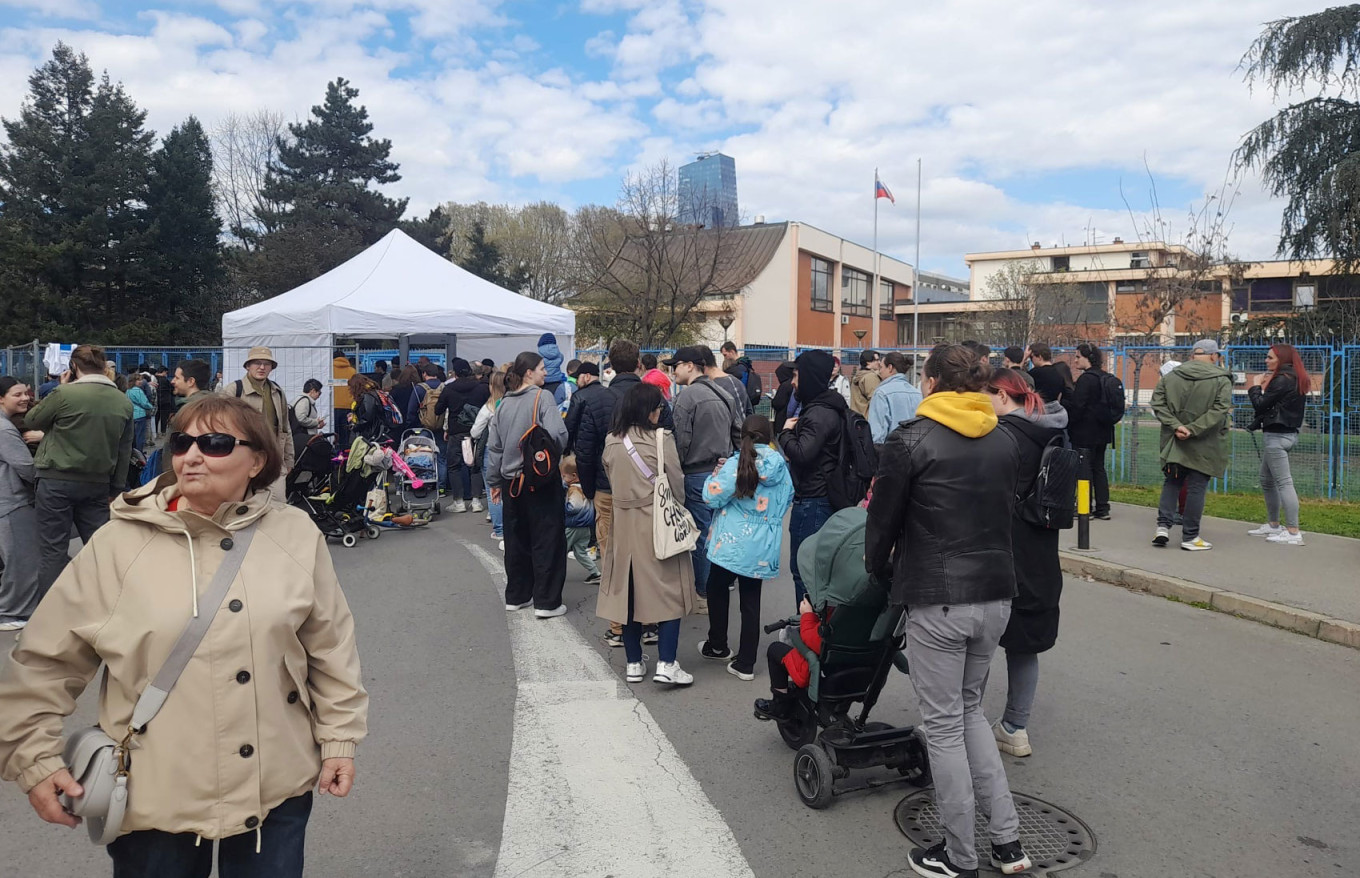
Serbia is a country whose government and population have pro-Kremlin inclinations — a consequence of NATO’s bombing campaign on Serbian cities in 1999 to halt dictator Slobodan Milosevic’s war on rebels in Kosovo. Shared Slavic Orthodox Christian ties add to their feelings of kinship.
Moscow has sought to exploit this sentiment through soft power. RT, a state propaganda outlet, opened a bureau in Serbia, and several Russian diplomats expelled from Europe later found refuge in Belgrade.
While in office, Serbian Security Intelligence head Aleksandar Vulin initiated the creation of a Russian-Serbian “working group” to monitor opposition activists, NGOs and independent journalists in the country.
Despite these challenges, Russians attending the Navalny memorial last month left messages of gratitude to Serbs for housing them and being “brotherly.”
Nastya, a freelance consultant standing in Sunday's line, said that even though Serbia tends to be a pro-Kremlin country, she still feels free in Belgrade.
“Russians in exile feel really supported by the Serbs. Even if many older people support Kremlin propaganda, we also see how people are opening their doors to us. The police are here to protect us,” she said after observing the Serbian police break up a fight between Nikitin and the provocateur.
“The Serbs never complain that thousands of us flooded their country and raised prices, they’re just so welcoming and friendly.”
A Message from The Moscow Times:
Dear readers,
We are facing unprecedented challenges. Russia's Prosecutor General's Office has designated The Moscow Times as an "undesirable" organization, criminalizing our work and putting our staff at risk of prosecution. This follows our earlier unjust labeling as a "foreign agent."
These actions are direct attempts to silence independent journalism in Russia. The authorities claim our work "discredits the decisions of the Russian leadership." We see things differently: we strive to provide accurate, unbiased reporting on Russia.
We, the journalists of The Moscow Times, refuse to be silenced. But to continue our work, we need your help.
Your support, no matter how small, makes a world of difference. If you can, please support us monthly starting from just $2. It's quick to set up, and every contribution makes a significant impact.
By supporting The Moscow Times, you're defending open, independent journalism in the face of repression. Thank you for standing with us.
Remind me later.


